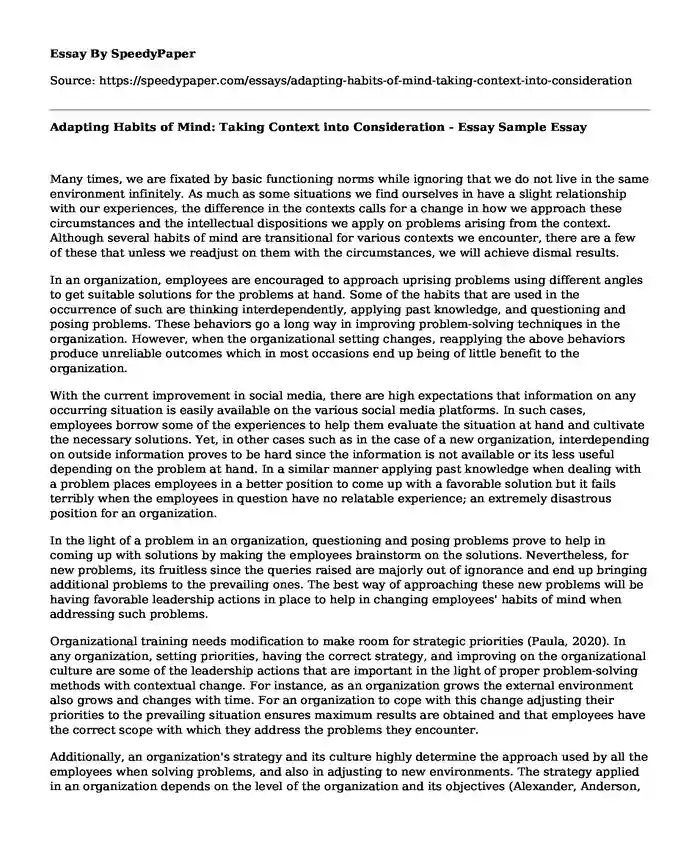Many times, we are fixated by basic functioning norms while ignoring that we do not live in the same environment infinitely. As much as some situations we find ourselves in have a slight relationship with our experiences, the difference in the contexts calls for a change in how we approach these circumstances and the intellectual dispositions we apply on problems arising from the context. Although several habits of mind are transitional for various contexts we encounter, there are a few of these that unless we readjust on them with the circumstances, we will achieve dismal results.
In an organization, employees are encouraged to approach uprising problems using different angles to get suitable solutions for the problems at hand. Some of the habits that are used in the occurrence of such are thinking interdependently, applying past knowledge, and questioning and posing problems. These behaviors go a long way in improving problem-solving techniques in the organization. However, when the organizational setting changes, reapplying the above behaviors produce unreliable outcomes which in most occasions end up being of little benefit to the organization.
With the current improvement in social media, there are high expectations that information on any occurring situation is easily available on the various social media platforms. In such cases, employees borrow some of the experiences to help them evaluate the situation at hand and cultivate the necessary solutions. Yet, in other cases such as in the case of a new organization, interdepending on outside information proves to be hard since the information is not available or its less useful depending on the problem at hand. In a similar manner applying past knowledge when dealing with a problem places employees in a better position to come up with a favorable solution but it fails terribly when the employees in question have no relatable experience; an extremely disastrous position for an organization.
In the light of a problem in an organization, questioning and posing problems prove to help in coming up with solutions by making the employees brainstorm on the solutions. Nevertheless, for new problems, its fruitless since the queries raised are majorly out of ignorance and end up bringing additional problems to the prevailing ones. The best way of approaching these new problems will be having favorable leadership actions in place to help in changing employees' habits of mind when addressing such problems.
Organizational training needs modification to make room for strategic priorities (Paula, 2020). In any organization, setting priorities, having the correct strategy, and improving on the organizational culture are some of the leadership actions that are important in the light of proper problem-solving methods with contextual change. For instance, as an organization grows the external environment also grows and changes with time. For an organization to cope with this change adjusting their priorities to the prevailing situation ensures maximum results are obtained and that employees have the correct scope with which they address the problems they encounter.
Additionally, an organization's strategy and its culture highly determine the approach used by all the employees when solving problems, and also in adjusting to new environments. The strategy applied in an organization depends on the level of the organization and its objectives (Alexander, Anderson, Anterasian & Lee, 2017). Perfect knowledge of the objectives and the organizational position helps employees to work in light of renowned expectations and also ensuring they deliver the required quality. Notably, the organizational culture highly determines how the employees function since it outlines the organization's expectations and how employees embrace contextual change. Readjustment of rigid cultures and critical implementation of favorable cultures are of immeasurable importance in helping employees function to the best of their ability especially in encountering new problems and changes in the organization.
References
Alexander, W., Anderson, M., Anterasian, C., & Lee, J. (2017). Context Matters: The Five Elements of Context That Most Impact Senior Leader Success. Spencerstuart.
Paula, J. (2020). ESTABLISHING THE RESEARCH CONTEXT. An Activity Based Approach.
Cite this page
Adapting Habits of Mind: Taking Context into Consideration - Essay Sample. (2023, Nov 28). Retrieved from https://speedypaper.net/essays/adapting-habits-of-mind-taking-context-into-consideration
Request Removal
If you are the original author of this essay and no longer wish to have it published on the SpeedyPaper website, please click below to request its removal:
- The Guitar Heard Around the World - PR Essay Example
- Free Essay with Social Media Strategy Example
- Creating Offerings on the Example of Diet Coke. Free Essay.
- Free Essay Sample: The Standards of Professionalism
- Essay Sample on Recruitment: Finding the Perfect Employee for Your Company
- Essay Sample on Lewin's Field Theory
- Free Essay Sample on Life Change
Popular categories





